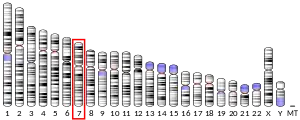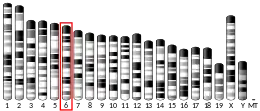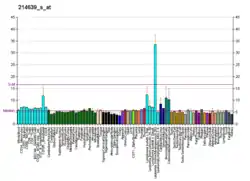Homeobox A1
Homeobox protein Hox-A1 is a protein that in humans is encoded by the HOXA1 gene.[5][6][7]
Gene
Two transcript variants encoding two different isoforms have been found for this gene, with only one of the isoforms containing the homeodomain region.[8]
Function
In vertebrates, the genes encoding the class of transcription factors called homeobox genes are found in clusters named A, B, C, and D on four separate chromosomes. Expression of these proteins is spatially and temporally regulated during embryonic development. This gene is part of the A cluster on chromosome 7 and encodes a DNA-binding transcription factor which may regulate gene expression, morphogenesis, and cellular differentiation. The homeobox protein Hox-A1 may be involved in the placement of hindbrain segments in the proper location along the anterior-posterior axis during development.[8]
Clinical significance
A common polymorphism in the HOXA1 gene is associated with a susceptibility to autism spectrum disorder, with individuals possessing these gene variant have an approximately doubled risk of developing the disorder.[9] Studies on knockout mice have indicated that the gene can alter embryological development of the brain stem (specifically the facial and superior olivary nuclei), as well as induce several other physical changes such as in ear shape.[10] Both of these sets of changes can also be seen in patients with autism.
Other HOXA1 mutations are associated with Bosley-Salih-Alorainy syndrome (BSAS) or the Athabascan brainstem dysgenesis syndrome (ABDS).[11]
See also
References
- GRCh38: Ensembl release 89: ENSG00000105991 - Ensembl, May 2017
- GRCm38: Ensembl release 89: ENSMUSG00000029844 - Ensembl, May 2017
- "Human PubMed Reference:". National Center for Biotechnology Information, U.S. National Library of Medicine.
- "Mouse PubMed Reference:". National Center for Biotechnology Information, U.S. National Library of Medicine.
- Hong YS, Kim SY, Bhattacharya A, Pratt DR, Hong WK, Tainsky MA (July 1995). "Structure and function of the HOX A1 human homeobox gene cDNA". Gene. 159 (2): 209–14. doi:10.1016/0378-1119(95)92712-G. PMID 7622051.
- Apiou F, Flagiello D, Cillo C, Malfoy B, Poupon MF, Dutrillaux B (1996). "Fine mapping of human HOX gene clusters". Cytogenetics and Cell Genetics. 73 (1–2): 114–5. doi:10.1159/000134320. PMID 8646877.
- McAlpine PJ, Shows TB (July 1990). "Nomenclature for human homeobox genes". Genomics. 7 (3): 460. doi:10.1016/0888-7543(90)90186-X. PMID 1973146.
- "Entrez Gene: HOXA1 homeobox A1".
- Ingram JL, Stodgell CJ, Hyman SL, Figlewicz DA, Weitkamp LR, Rodier PM (December 2000). "Discovery of allelic variants of HOXA1 and HOXB1: genetic susceptibility to autism spectrum disorders". Teratology. 62 (6): 393–405. doi:10.1002/1096-9926(200012)62:6<393::AID-TERA6>3.0.CO;2-V. PMID 11091361.
- Rodier, Patricia (February 2000). "The Early Origins of Autism". Scientific American. 282 (2): 56–63. Bibcode:2000SciAm.282b..56R. doi:10.1038/scientificamerican0200-56. PMID 10710787.
- Bosley TM, Alorainy IA, Salih MA, Aldhalaan HM, Abu-Amero KK, Oystreck DT, Tischfield MA, Engle EC, Erickson RP (May 2008). "The clinical spectrum of homozygous HOXA1 mutations". American Journal of Medical Genetics Part A. 146A (10): 1235–40. doi:10.1002/ajmg.a.32262. PMC 3517166. PMID 18412118.
- Garzon R, Pichiorri F, Palumbo T, Iuliano R, Cimmino A, Aqeilan R, Volinia S, Bhatt D, Alder H, Marcucci G, Calin GA, Liu CG, Bloomfield CD, Andreeff M, Croce CM (March 2006). "MicroRNA fingerprints during human megakaryocytopoiesis". Proceedings of the National Academy of Sciences of the United States of America. 103 (13): 5078–83. Bibcode:2006PNAS..103.5078G. doi:10.1073/pnas.0600587103. PMC 1458797. PMID 16549775.
Further reading
- Chariot A, Moreau L, Senterre G, Sobel ME, Castronovo V (October 1995). "Retinoic acid induces three newly cloned HOXA1 transcripts in MCF7 breast cancer cells". Biochemical and Biophysical Research Communications. 215 (2): 713–20. doi:10.1006/bbrc.1995.2522. hdl:2268/3751. PMID 7488013.
- Studer M, Gavalas A, Marshall H, Ariza-McNaughton L, Rijli FM, Chambon P, Krumlauf R (March 1998). "Genetic interactions between Hoxa1 and Hoxb1 reveal new roles in regulation of early hindbrain patterning". Development. 125 (6): 1025–36. doi:10.1242/dev.125.6.1025. PMID 9463349.
- Green NC, Rambaldi I, Teakles J, Featherstone MS (May 1998). "A conserved C-terminal domain in PBX increases DNA binding by the PBX homeodomain and is not a primary site of contact for the YPWM motif of HOXA1". The Journal of Biological Chemistry. 273 (21): 13273–9. doi:10.1074/jbc.273.21.13273. PMID 9582372.
- Barrow JR, Capecchi MR (November 1999). "Compensatory defects associated with mutations in Hoxa1 restore normal palatogenesis to Hoxa2 mutants". Development. 126 (22): 5011–26. doi:10.1242/dev.126.22.5011. PMID 10529419.
- Calvo R, West J, Franklin W, Erickson P, Bemis L, Li E, Helfrich B, Bunn P, Roche J, Brambilla E, Rosell R, Gemmill RM, Drabkin HA (November 2000). "Altered HOX and WNT7A expression in human lung cancer". Proceedings of the National Academy of Sciences of the United States of America. 97 (23): 12776–81. Bibcode:2000PNAS...9712776C. doi:10.1073/pnas.97.23.12776. PMC 18840. PMID 11070089.
- Li J, Tabor HK, Nguyen L, Gleason C, Lotspeich LJ, Spiker D, Risch N, Myers RM (January 2002). "Lack of association between HoxA1 and HoxB1 gene variants and autism in 110 multiplex families". American Journal of Medical Genetics. 114 (1): 24–30. doi:10.1002/ajmg.1618. PMID 11840501.
- Kosaki K, Kosaki R, Suzuki T, Yoshihashi H, Takahashi T, Sasaki K, Tomita M, McGinnis W, Matsuo N (February 2002). "Complete mutation analysis panel of the 39 human HOX genes". Teratology. 65 (2): 50–62. doi:10.1002/tera.10009. PMID 11857506.
- Devlin B, Bennett P, Cook EH, Dawson G, Gonen D, Grigorenko EL, McMahon W, Pauls D, Smith M, Spence MA, Schellenberg GD (August 2002). "No evidence for linkage of liability to autism to HOXA1 in a sample from the CPEA network". American Journal of Medical Genetics. 114 (6): 667–72. doi:10.1002/ajmg.10603. PMID 12210285. S2CID 23795745.
- Rodier PM (2003). "Converging evidence for brain stem injury in autism". Development and Psychopathology. 14 (3): 537–57. doi:10.1017/s0954579402003085. PMID 12349873. S2CID 19453261.
- Zhang X, Zhu T, Chen Y, Mertani HC, Lee KO, Lobie PE (February 2003). "Human growth hormone-regulated HOXA1 is a human mammary epithelial oncogene". The Journal of Biological Chemistry. 278 (9): 7580–90. doi:10.1074/jbc.M212050200. PMID 12482855.
- Conciatori M, Stodgell CJ, Hyman SL, O'Bara M, Militerni R, Bravaccio C, Trillo S, Montecchi F, Schneider C, Melmed R, Elia M, Crawford L, Spence SJ, Muscarella L, Guarnieri V, D'Agruma L, Quattrone A, Zelante L, Rabinowitz D, Pascucci T, Puglisi-Allegra S, Reichelt KL, Rodier PM, Persico AM (February 2004). "Association between the HOXA1 A218G polymorphism and increased head circumference in patients with autism". Biological Psychiatry. 55 (4): 413–9. doi:10.1016/j.biopsych.2003.10.005. PMID 14960295. S2CID 6903399.
- Tischfield MA, Bosley TM, Salih MA, Alorainy IA, Sener EC, Nester MJ, Oystreck DT, Chan WM, Andrews C, Erickson RP, Engle EC (October 2005). "Homozygous HOXA1 mutations disrupt human brainstem, inner ear, cardiovascular and cognitive development". Nature Genetics. 37 (10): 1035–7. doi:10.1038/ng1636. PMID 16155570. S2CID 12062207.
External links
- HOXA1+protein,+human at the U.S. National Library of Medicine Medical Subject Headings (MeSH)
This article incorporates text from the United States National Library of Medicine, which is in the public domain.




